模块3 Unit 8 Adventuremarco polo
文档属性
| 名称 | 模块3 Unit 8 Adventuremarco polo | 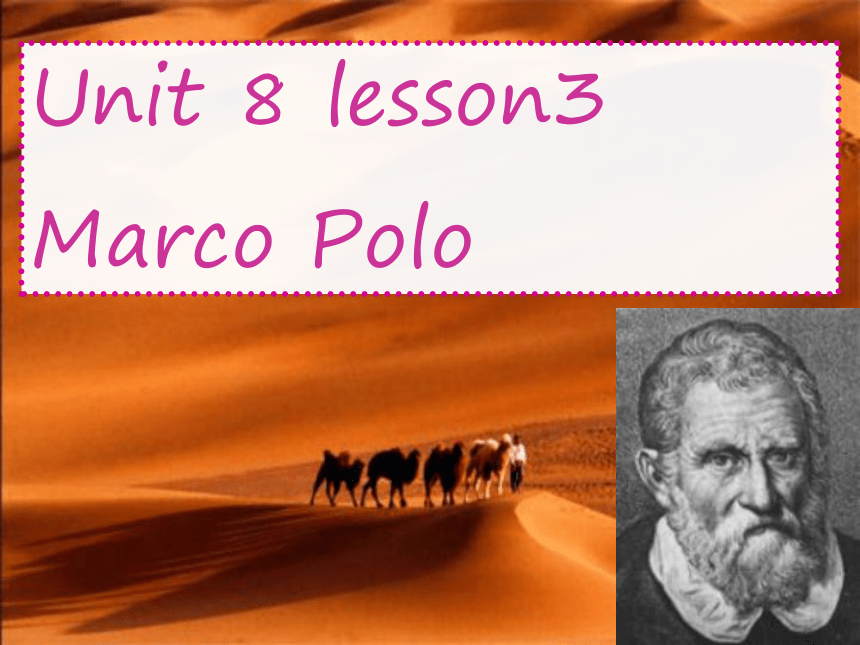 | |
| 格式 | zip | ||
| 文件大小 | 1.6MB | ||
| 资源类型 | 教案 | ||
| 版本资源 | 北师大版 | ||
| 科目 | 英语 | ||
| 更新时间 | 2012-04-20 23:15:52 | ||
图片预览

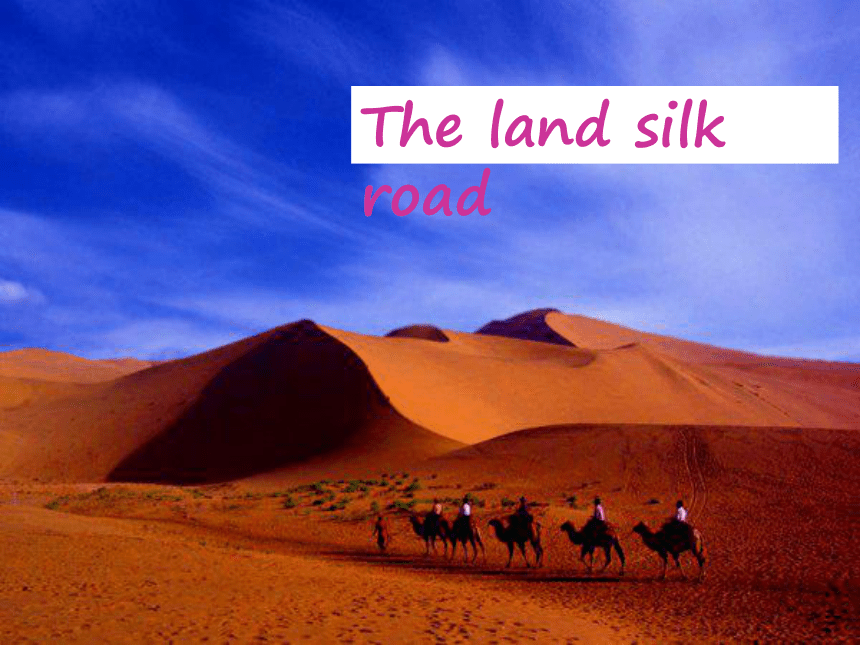
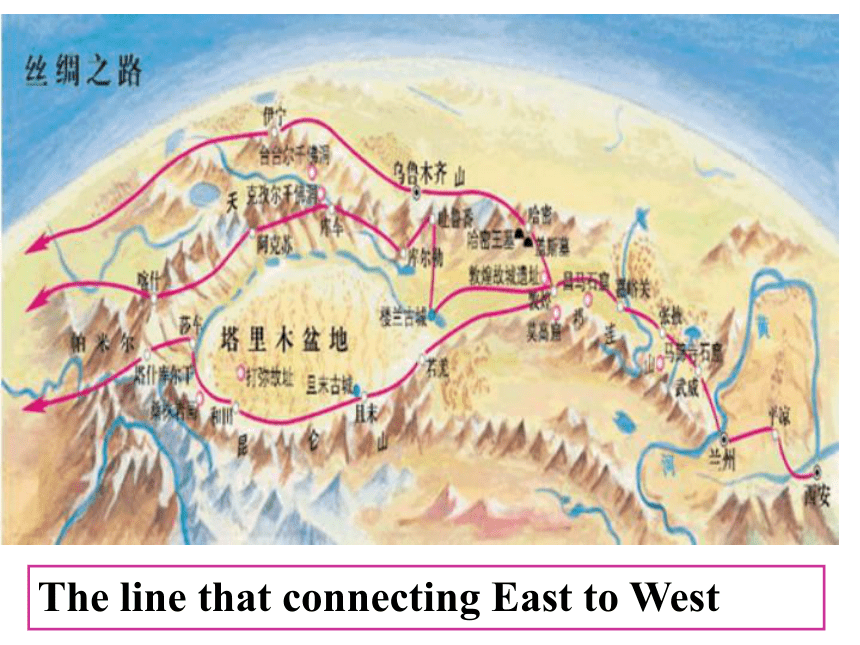
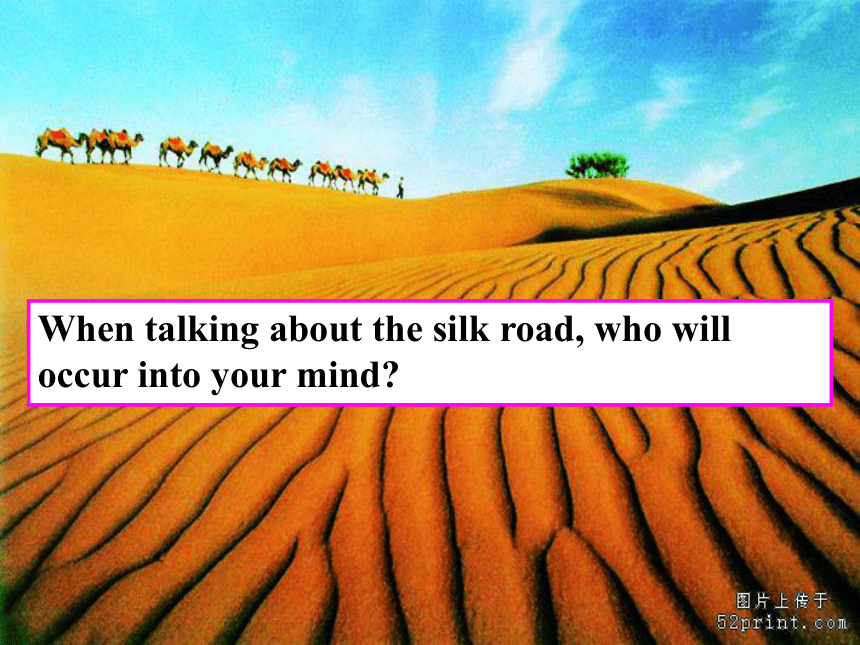
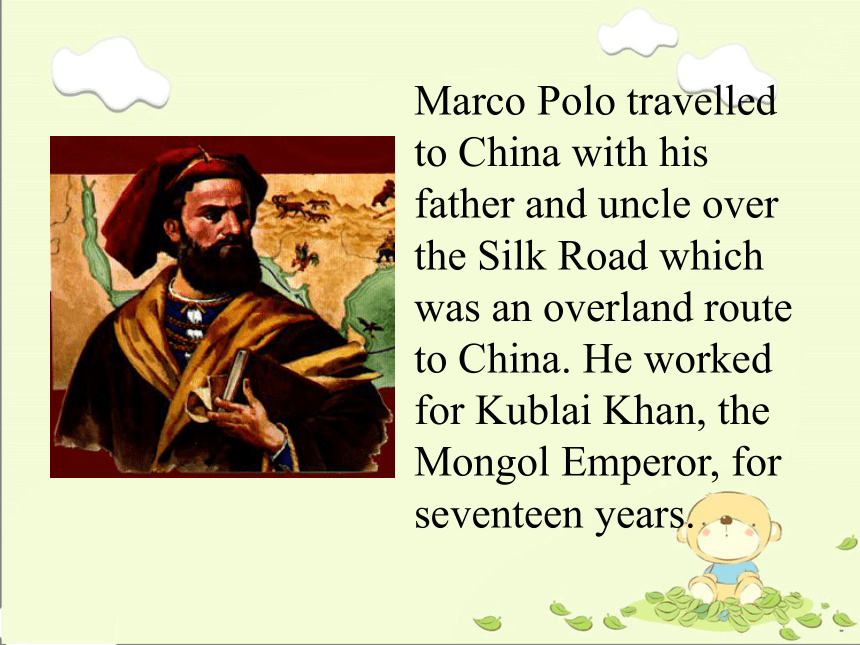
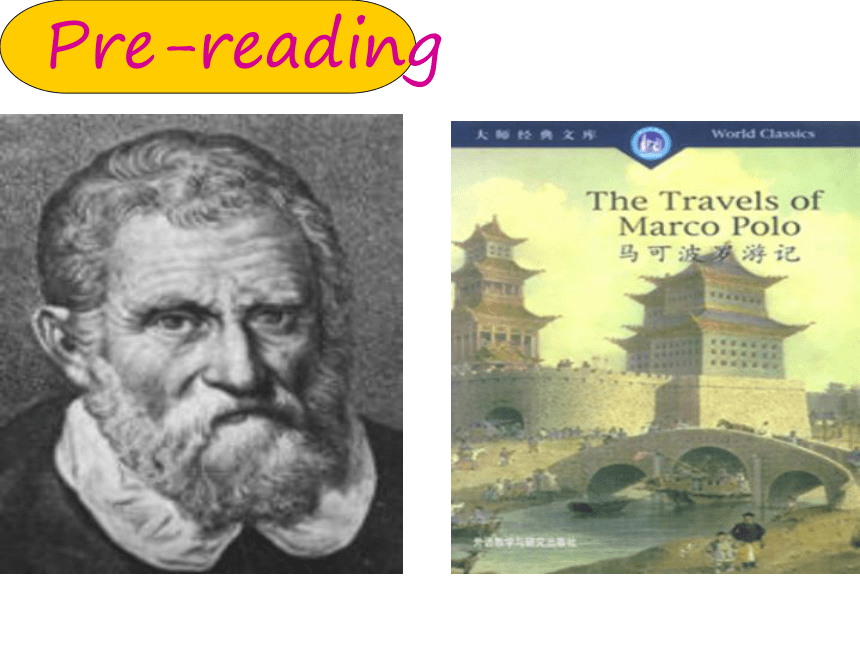
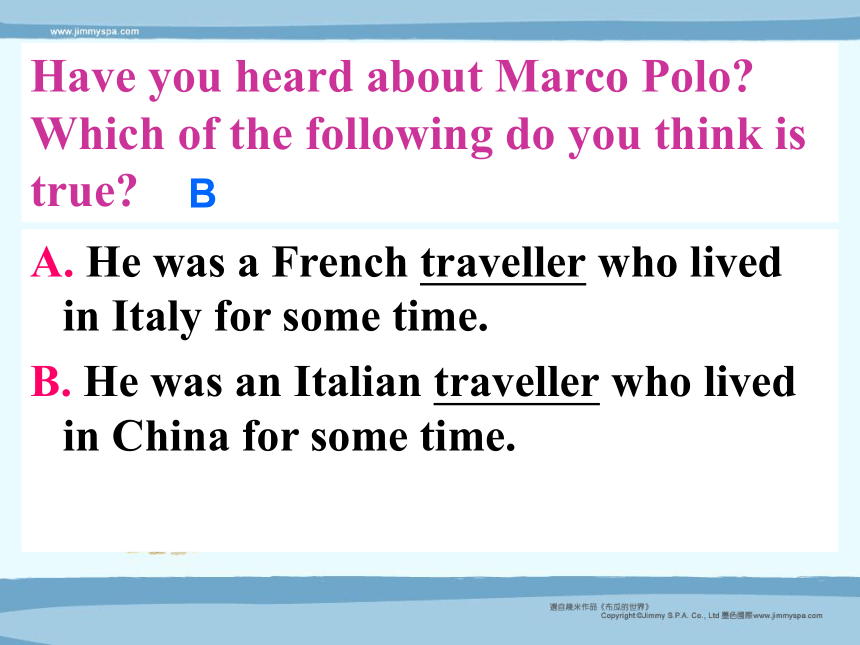

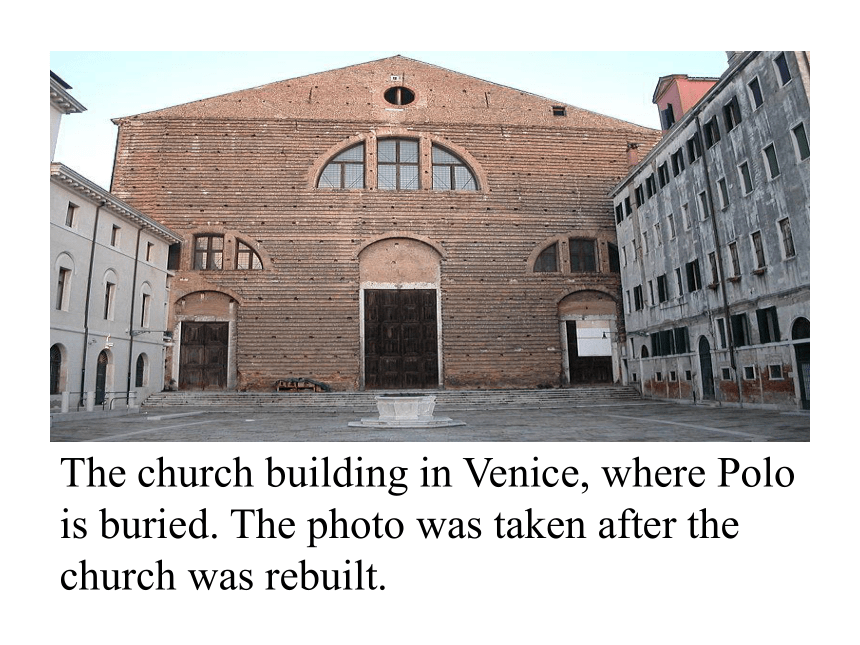
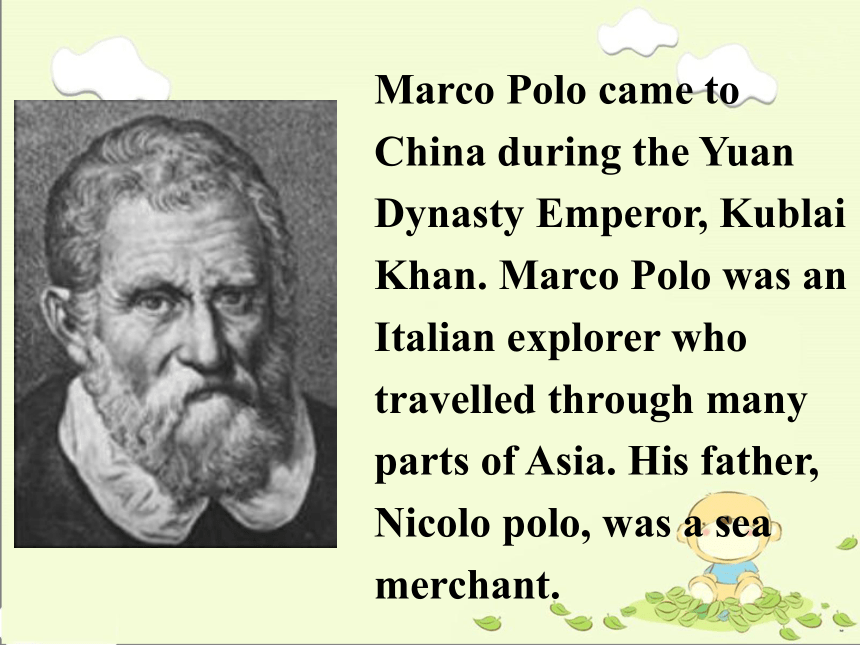
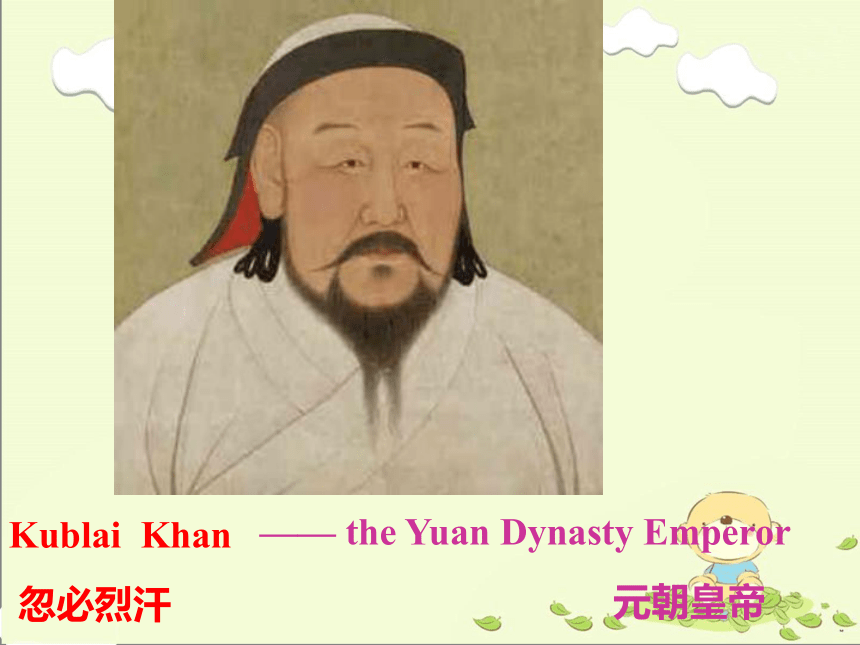
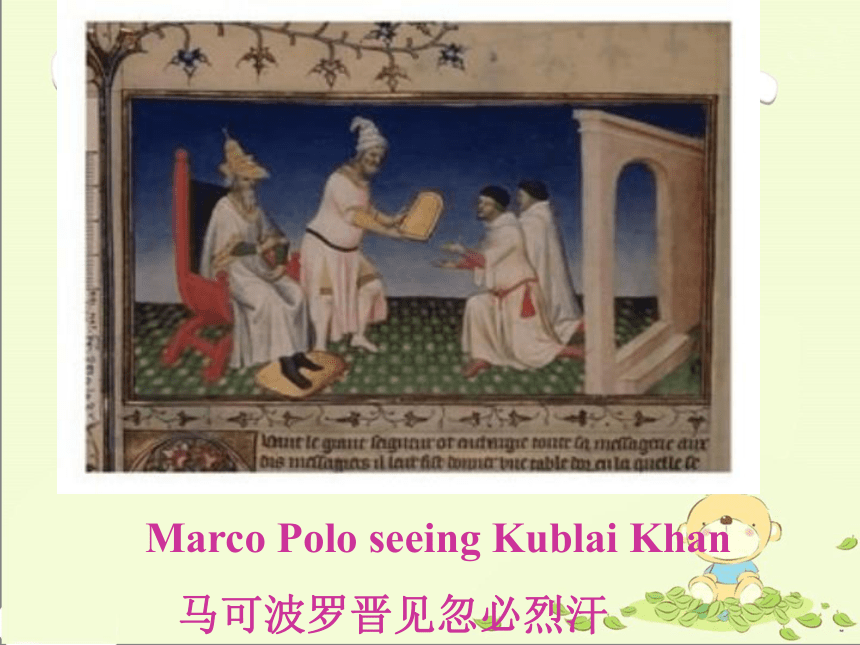
文档简介
(共41张PPT)
Unit 8 lesson3
Marco Polo
The land silk road
The line that connecting East to West
When talking about the silk road, who will occur into your mind
Marco Polo travelled to China with his father and uncle over the Silk Road which was an overland route to China. He worked for Kublai Khan, the Mongol Emperor, for seventeen years.
Pre-reading
Have you heard about Marco Polo Which of the following do you think is true
A. He was a French traveller who lived in Italy for some time.
B. He was an Italian traveller who lived in China for some time.
B
This is Marco’s traveling map.
The church building in Venice, where Polo is buried. The photo was taken after the church was rebuilt.
Marco Polo came to China during the Yuan Dynasty Emperor, Kublai Khan. Marco Polo was an Italian explorer who travelled through many parts of Asia. His father, Nicolo polo, was a sea merchant.
Kublai Khan
忽必烈汗
—— the Yuan Dynasty Emperor
元朝皇帝
Marco Polo seeing Kublai Khan
马可波罗晋见忽必烈汗
Warship (战船)
in Marco’s time
Marco was telling stories
about China in the prison (监狱).
The Travel of Marco Polo
Books talked about Marco Polo in China
Fast reading
Listen to the text and match the paragraphs with the main idea.
Para.1
Para.2
Para.3
Para.4
Para.5
Para.6
Marco Polo's early life
Marco returned to Italy
Inventions and developments in China
Kublai Khan welcomed Marco
Marco was amazed at China
People’s reaction to Marco’s stories
Read through the text carefully, and find out the information about Marco Polo. Then do two tasks.
Second reading
Name:
Born (when/where):
Came to China (when):
Languages (how many):
Worked in China (how many years):
Returned to Italy (when):
Age of his death:
The name of his book:
Marco Polo
1254, Italy
1271
4
17
1291
70
The Description of the World
Task1:
1) Which of the following is the CORRECT time order of the events that happened to Marco
a. He was caught in a war in Italy.
b. He arrived in Beijing.
c. He served in the Chinese Emperor’s court.
d. He told stories about China to an author.
A. bdca B. bcda C. bcad D. abcd
Answer:
C
Task 2. Choose the best answers:
2) What CANNOT be found in Europe during the time when Marco was in China
A. Gold. B. Market.
C. Trade. D. Paper money.
3) What does the word “serve” in the second paragraph mean
A. To work or perform one’s duties.
B. To offer food.
C. To help a customer.
D. To be suitable for a purpose.
Answers:
D
A
4) According to the last two paragraphs, Marco _________.
A. wrote a book about China himself
B. made up false stories about China
C. became wealthy when he returned to
Italy
D. didn’t take part in the local war
Answers:
C
The third reading
Read the passage again and answer the following questions.
Part III
third-reading
Read the passage again and answer the following questions.
1) Why did Marco and his father travel to China (Para.1)
Because Marco’s father wanted to do trade with the Chinese.
2) Why was the Emperor impressed with Marco (Para.2)
3) Why was Marco surprised to see people using paper money (Para.4)
4) What were the black stones Marco saw people burning for fuel (Para.4)
Because Marco was very clever and could already speak four languages.
Because in Europe people paid for goods with gold or silver.
They were coal.
How long did Marco spend in China
6) Why was he imprisoned when he went back to Italy (Para.5)
7) What was the name of his book
For 17 years.
Because a local war had broken out. During the war he was captured by the enemy.
The Description of the World.
Part VI
Summary
Marco Polo was 17 years old, he travelled across Europe and Asia with 1. _________ who wanted to do 2. __________ with the Chinese. When they arrived in Beijing, the Emperor 3. _________ them. Marco, who was very clever and could speak four languages, 4. _________ the Emperor and they became friends. The Emperor sent him to do many 5. ______________.
his father
trade
welcomed
impressed
important tasks
Marco was amazed by how beautiful and 6. _________ China was. He was very impressed by Beijing and the Emperor’s Palace, especially 7. ________________, whose walls were covered in gold and silver. There were 8. _________________ in China which didn’t exist in Europe at that time. Marco was surprised to see Chinese people using 9. __________ in the markets. He was also confused by the black stones people used to 10. ____________.
powerful
the Summer Palace
inventions and develops
paper money
burn for fuel
In 1291, Marco returned to Italy. Not long after his return, Marco was caught by the enemy in a local war and 11. ___________. He told his stories about China to another prisoner who was 12. ____________. He noted them down and wrote them into a book, which became one of the 13. ___________ books in Europe. Many people thought the stories were 14. _________ although they enjoyed reading it.
put into prison
an author
best-selling
not true
1. start
2. as a result
3. Insist that something is true
4. writer
5. rich
in turn, wealthy, author,
break out, stand by
Read the passage again and match the words in the box with their definitions.
break out
wealthy
in turn
stand by
author
Complete the sentences using the words from exercise 3.
He became _________ through hard work and careful saving.
2. He is a successful ________. He has already written three best selling novels.
wealthy
author
in turn, wealthy, author,
break out, stand by
3. The president told the reporter that he wanted to __________ his earlier statement.
4. In the past, without clean running water, disease would often ___________ in cities .
5. The customer praised the manager, who, ___________ praised his staff.
break out
in turn
stand by
1.trade (n) & (v) 贸易;商业
与某人做生意 do ~ with sb.
~ with sb.
Our country does trade with a lot of
European countries.
trade in sth做…生意、买卖
He trades in silk.
trade sth for sth.用某物交换某物
I traded three apples for a bunch of bananas.
trade on利用…以图私利,(不公正的)利用
He always trades on my sympathy.
impress留下印象;使…明白重要性
impress sb. with sth. impress sth. on sb.
My father impressed me with the importance of hard work.
His words are strongly impressed on my memory and I am deeply impressed by them.
be impressed by/ at/ with
I was impressed by/ at/ with his speech.
serve vt. 服务 、侍候、端上…
vi.供职、任职、服役 serve in the army
~ (sb.) as sth. 为(某人)工作;当某职、担任
e.g. Tony serves (his boss) as a driver for many years.
~ sb. with sth. =serve sth. to sb.为某人提供,端上…
e.g. Lily likes to serve her guests with coffee
describe as 把---说成
describe sth. /sb. as + adj. / n.把---说成
e.g. He described my plan as unrealistic.
He describes himself as an artist.
seat (n)座位;(v) 使坐下;容纳
take a seat 就坐
e.g. Please go back to your seat.
She seated herself on the sofa.
The aircraft seats 200 passengers.
be available (adj.)
(物)可得到的;可用的;可看见的;
(人)有空的,在的
available resources可利用的资源
This was the only room available.
The library is available during summer vacation.
The doctor is not available now.
confuse (vt.) 使人困惑,使弄错
e.g. The difficult question confused him.
be confused by … 对(因)…感到困惑
e.g. People were confused by a lot of
information.
tell sth. to sb. = tell sb. sth.
e.g. I am going to tell you my secret.
I am going to tell my secret to you.
house:
This is the house where Lincoln was born.
farm:
This is the farm where Lincoln worked.
theatre:
This is the theatre where Lincoln was shot.
1809:
The year when Lincoln was born is 1809
1818:
The year when Lincoln’s mother died is 1818.
1860:
The year when Lincoln became present is 1860.
_____
in which
______
on which
_____
at which
___
in which
___
in which
____
in which
Fill in the blanks with “which”,“when”,“where”:
1.This is the factory _______ we will visit.
2.This is the place _______ he was born in.
3. This is the place _______ he was born.
4. I remember the days_______ we spent.
5. This is the factory ______ we works.
6. This is the place _______ we live in .
7. This is the place _______ we live.
8. This is the time ______ he died.
which
which
where
which
where
which
where
when
Unit 8 lesson3
Marco Polo
The land silk road
The line that connecting East to West
When talking about the silk road, who will occur into your mind
Marco Polo travelled to China with his father and uncle over the Silk Road which was an overland route to China. He worked for Kublai Khan, the Mongol Emperor, for seventeen years.
Pre-reading
Have you heard about Marco Polo Which of the following do you think is true
A. He was a French traveller who lived in Italy for some time.
B. He was an Italian traveller who lived in China for some time.
B
This is Marco’s traveling map.
The church building in Venice, where Polo is buried. The photo was taken after the church was rebuilt.
Marco Polo came to China during the Yuan Dynasty Emperor, Kublai Khan. Marco Polo was an Italian explorer who travelled through many parts of Asia. His father, Nicolo polo, was a sea merchant.
Kublai Khan
忽必烈汗
—— the Yuan Dynasty Emperor
元朝皇帝
Marco Polo seeing Kublai Khan
马可波罗晋见忽必烈汗
Warship (战船)
in Marco’s time
Marco was telling stories
about China in the prison (监狱).
The Travel of Marco Polo
Books talked about Marco Polo in China
Fast reading
Listen to the text and match the paragraphs with the main idea.
Para.1
Para.2
Para.3
Para.4
Para.5
Para.6
Marco Polo's early life
Marco returned to Italy
Inventions and developments in China
Kublai Khan welcomed Marco
Marco was amazed at China
People’s reaction to Marco’s stories
Read through the text carefully, and find out the information about Marco Polo. Then do two tasks.
Second reading
Name:
Born (when/where):
Came to China (when):
Languages (how many):
Worked in China (how many years):
Returned to Italy (when):
Age of his death:
The name of his book:
Marco Polo
1254, Italy
1271
4
17
1291
70
The Description of the World
Task1:
1) Which of the following is the CORRECT time order of the events that happened to Marco
a. He was caught in a war in Italy.
b. He arrived in Beijing.
c. He served in the Chinese Emperor’s court.
d. He told stories about China to an author.
A. bdca B. bcda C. bcad D. abcd
Answer:
C
Task 2. Choose the best answers:
2) What CANNOT be found in Europe during the time when Marco was in China
A. Gold. B. Market.
C. Trade. D. Paper money.
3) What does the word “serve” in the second paragraph mean
A. To work or perform one’s duties.
B. To offer food.
C. To help a customer.
D. To be suitable for a purpose.
Answers:
D
A
4) According to the last two paragraphs, Marco _________.
A. wrote a book about China himself
B. made up false stories about China
C. became wealthy when he returned to
Italy
D. didn’t take part in the local war
Answers:
C
The third reading
Read the passage again and answer the following questions.
Part III
third-reading
Read the passage again and answer the following questions.
1) Why did Marco and his father travel to China (Para.1)
Because Marco’s father wanted to do trade with the Chinese.
2) Why was the Emperor impressed with Marco (Para.2)
3) Why was Marco surprised to see people using paper money (Para.4)
4) What were the black stones Marco saw people burning for fuel (Para.4)
Because Marco was very clever and could already speak four languages.
Because in Europe people paid for goods with gold or silver.
They were coal.
How long did Marco spend in China
6) Why was he imprisoned when he went back to Italy (Para.5)
7) What was the name of his book
For 17 years.
Because a local war had broken out. During the war he was captured by the enemy.
The Description of the World.
Part VI
Summary
Marco Polo was 17 years old, he travelled across Europe and Asia with 1. _________ who wanted to do 2. __________ with the Chinese. When they arrived in Beijing, the Emperor 3. _________ them. Marco, who was very clever and could speak four languages, 4. _________ the Emperor and they became friends. The Emperor sent him to do many 5. ______________.
his father
trade
welcomed
impressed
important tasks
Marco was amazed by how beautiful and 6. _________ China was. He was very impressed by Beijing and the Emperor’s Palace, especially 7. ________________, whose walls were covered in gold and silver. There were 8. _________________ in China which didn’t exist in Europe at that time. Marco was surprised to see Chinese people using 9. __________ in the markets. He was also confused by the black stones people used to 10. ____________.
powerful
the Summer Palace
inventions and develops
paper money
burn for fuel
In 1291, Marco returned to Italy. Not long after his return, Marco was caught by the enemy in a local war and 11. ___________. He told his stories about China to another prisoner who was 12. ____________. He noted them down and wrote them into a book, which became one of the 13. ___________ books in Europe. Many people thought the stories were 14. _________ although they enjoyed reading it.
put into prison
an author
best-selling
not true
1. start
2. as a result
3. Insist that something is true
4. writer
5. rich
in turn, wealthy, author,
break out, stand by
Read the passage again and match the words in the box with their definitions.
break out
wealthy
in turn
stand by
author
Complete the sentences using the words from exercise 3.
He became _________ through hard work and careful saving.
2. He is a successful ________. He has already written three best selling novels.
wealthy
author
in turn, wealthy, author,
break out, stand by
3. The president told the reporter that he wanted to __________ his earlier statement.
4. In the past, without clean running water, disease would often ___________ in cities .
5. The customer praised the manager, who, ___________ praised his staff.
break out
in turn
stand by
1.trade (n) & (v) 贸易;商业
与某人做生意 do ~ with sb.
~ with sb.
Our country does trade with a lot of
European countries.
trade in sth做…生意、买卖
He trades in silk.
trade sth for sth.用某物交换某物
I traded three apples for a bunch of bananas.
trade on利用…以图私利,(不公正的)利用
He always trades on my sympathy.
impress留下印象;使…明白重要性
impress sb. with sth. impress sth. on sb.
My father impressed me with the importance of hard work.
His words are strongly impressed on my memory and I am deeply impressed by them.
be impressed by/ at/ with
I was impressed by/ at/ with his speech.
serve vt. 服务 、侍候、端上…
vi.供职、任职、服役 serve in the army
~ (sb.) as sth. 为(某人)工作;当某职、担任
e.g. Tony serves (his boss) as a driver for many years.
~ sb. with sth. =serve sth. to sb.为某人提供,端上…
e.g. Lily likes to serve her guests with coffee
describe as 把---说成
describe sth. /sb. as + adj. / n.把---说成
e.g. He described my plan as unrealistic.
He describes himself as an artist.
seat (n)座位;(v) 使坐下;容纳
take a seat 就坐
e.g. Please go back to your seat.
She seated herself on the sofa.
The aircraft seats 200 passengers.
be available (adj.)
(物)可得到的;可用的;可看见的;
(人)有空的,在的
available resources可利用的资源
This was the only room available.
The library is available during summer vacation.
The doctor is not available now.
confuse (vt.) 使人困惑,使弄错
e.g. The difficult question confused him.
be confused by … 对(因)…感到困惑
e.g. People were confused by a lot of
information.
tell sth. to sb. = tell sb. sth.
e.g. I am going to tell you my secret.
I am going to tell my secret to you.
house:
This is the house where Lincoln was born.
farm:
This is the farm where Lincoln worked.
theatre:
This is the theatre where Lincoln was shot.
1809:
The year when Lincoln was born is 1809
1818:
The year when Lincoln’s mother died is 1818.
1860:
The year when Lincoln became present is 1860.
_____
in which
______
on which
_____
at which
___
in which
___
in which
____
in which
Fill in the blanks with “which”,“when”,“where”:
1.This is the factory _______ we will visit.
2.This is the place _______ he was born in.
3. This is the place _______ he was born.
4. I remember the days_______ we spent.
5. This is the factory ______ we works.
6. This is the place _______ we live in .
7. This is the place _______ we live.
8. This is the time ______ he died.
which
which
where
which
where
which
where
when
